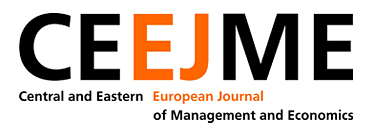 CENTRAL AND EASTERN EUROPEAN JOURNAL OF MANAGEMENT AND ECONOMICS
CENTRAL AND EASTERN EUROPEAN JOURNAL OF MANAGEMENT AND ECONOMICS
Vol. 2, No. 2, 69-141, June 2014,
WROCŁAW SCHOOL OF BANKING
Editor: Joost Platje
Contents: PDF download >>
Cover: PDF download >>
Vol. 2, No. 2, 71-92, June 2014
Cambodia’s Transition to Sustainable Development: Preconditions, Recommendations, Obstacles
Author: Ralph M. WROBEL Westsaxon University of Applied Science, Zwickau, Germany
Article: PDF download >>
Abstract: Cambodia suffered dramatically from the Khmer Rouge regime in 1975 to 1979 as well as from Vietnam’s invasion and the following civil war till 1989. Both caused enormous destruction, not only of infrastructure, educational institutions, the financial and health system, but – even more importantly – to its human capital. After 1989 Cambodia’s economic transformation started but is insufficient until now. The conception of a market order – introduced by Walter Eucken (1952/90) – may be a helpful approach to improve the economic and social situation in the country. But before constitutive or regulative principles of a market order can be implemented in Cambodia successfully some basic political problems must be solved. They are defined already by North / Wallis / Weingast (2009) as rule of law for the elite, civil society, and consolidated control of the military. Additionally, there are further obstacles which must be drawn into consideration like cultural differences etc. It is the aim of this paper to describe the political and economic situation in Cambodia briefly. Then the necessary preconditions for sustainable development in the country will be introduced. Subsequently an economic policy in line with the market order conception will be recommended and further obstacles will be discussed, at least.
Keywords: Cambodia, transition, sustainable development, social market economy
Vol. 2, No. 2, 93-119, June 2014
Towards a European competence region for renewable energy? Findings from the Danish-German border region
Authors: Wolfgang GERSTLBERGER University of Southern Denmark, Denmark
Tobias KESTING Münster University of Applied Sciences, Germany
Article: PDF download >>
Abstract: In view of the increasing relevance of renewable energy, Danish and German university partners of the European Future Renewable Energy (FURGY) project developed and conducted a qualitative and a quantitative regional foresight (“Delphi”) study which primarily provided the data for this article. Based on the main findings of this regional foresight study and additional data, we present and discuss in this article four different scenarios for the development of the renewable energy sector in the FURGY region until 2030. These scenarios describe four cases: (i) “modest improvement as “most probable future”, (ii) “worst case”, (iii) “predominantly negative case”, and (iv) “best case”. We conclude our article with concrete police recommendations which can help regional, national and European policy makers to initiate a transition process from “modest improvement” to “radical improvement” of the conditions for the renewable energy sector in Europe, its member states and regions.
Keywords: renewable energy, sustainability, cross-border cooperation, transition, foresight scenarios
Vol. 2, No. 2, 121-139, June 2014
Minimizing redundancies and ways to deal with trade-offs in decision making within integrated management systems
Author: Joost PLATJE Wrocław School of Banking, Poland
Article: PDF download >>
Abstract: Integrated Management Systems (IMS) are supposed to contribute to sustainable development. However, the moment a company only uses short term win-win situation to comply, the real contribution to sustainable development may be questionable. As trade-offs between sustainability aims and the company’s goals appear, companies may behave opportunistically, and externalize the elements which are difficult to fulfil in an IMS, e.g. by way of outsourcing. At such a moment, the IMS may function on paper, while the whole industry or logistic chain does not improve its contribution to sustainability. As a consequence, it may be necessary to assess the whole industry or logistic chain (logistic chain integration for IMS) regarding the impact of an IMS on sustainable development. After presenting the aims of the IMS and “the business case” for reducing redundancies and dealing with trade-offs, the issue of “externalizing” problems to parties outside the IMS is discussed. After a presentation of different solutions for dealing with this problem, some conclusions will be drawn.
Keywords: Integrated Management Systems, sustainable development, opportunistic behaviour, ISO 9001, ISO 14001, ISO 18001
Vol. 2, No. 2, 141-153, June 2014
Brand Image Management in Sport on the Example of Kolejarz Opole
Author: Paweł DRYNDA
Article: PDF download >>
Abstract: Sport is today no longer only a form of entertainment. Each professional club has to function as a normal corporation. The brand plays an important tole in economic success as well as successes in sport. The strength of the brand of a sport club depends on the image of this brand. The aim of this article is to apply theories usually applied to production and service companies to a sport organization. Focus is in particular od the management of the image of a sport brand and the importance for the sport organization on the example of the speedway club Kolejarz Opole (Opole, Poland).
Keywords: image management, sport brand, sport organization, Poland
